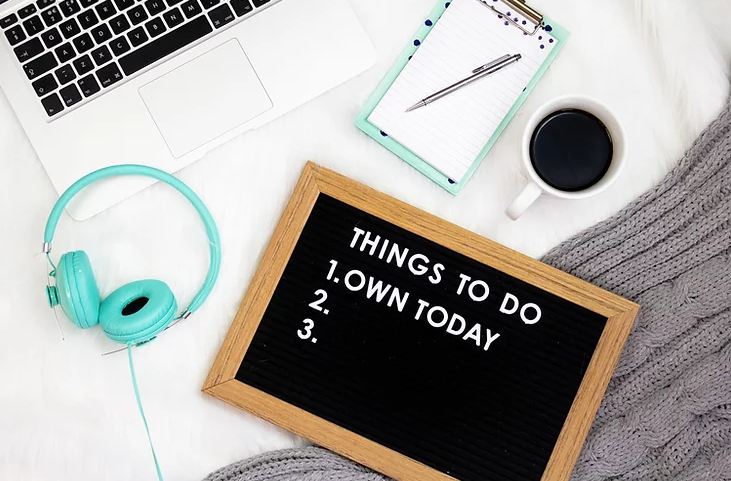
“Your future is found in your daily routine. Successful people do daily what others do occasionally.” – Paula White
Work, paying bills, cleaning, cooking, shopping, exercising, getting enough sleep, and taking care of a family are just some of the things millions of people do each day, and it is easy to be overwhelmed. It can feel impossible to get everything done, let alone take care of yourself – especially if you’re already struggling with mental health concerns such as depression or anxiety. By creating routines, we organise our days in such a way that taking care of tasks and ourselves becomes a pattern that makes it easier to get things done without having to think hard about them (Mental Health America, 2020).
The structure and ritual of a highly optimised routine can serve as the foundation for intellectual, social, and personal development. Here are some suggestions for creating an ideal routine. Your list should be NO LONGER than 12-15 items. This isn’t a step-by-step outline of your day, just a rough guideline. It should be a normal “weekday” routine (Sanders, 2019).
1. Decide what needs to be in your routine. Brainstorm all of the commitments and responsibilities you have in life right now. Then, try to think of everything that takes your time and energy each week (Hayley, Emily, & Bethany, 2020).
2. Make time for breaks and interruptions. If your routine is full of activity from the moment you wake up until the time you go to bed, you will probably burn out. So block out at least 30–60 minutes of free time a day (if possible) and at least a 5–15 minute break in between activities (WikiHow, 2019).
3. Set small goals. While a big goal is exciting to tackle, it often leads to failure as we take on too much. If your overall goal is to eat healthier meals, start by changing one thing every day to build confidence (Caplan, 2019).
4. Reduce unwanted activities from your day.
The goal is to tweak your actual schedule to form your daily routine instead of trying to invent a completely new plan for your day. Look over your list of activities and decide which ones you would like to spend less time on, such as procrastination or social media (WikiHow, 2019).
5. Layout a plan. Start with one week at a time and start small – that way you can build on simple accomplishments. Then, write it all out on a calendar, almost like an appointment (Caplan, 2019).
6. Be consistent with time. If you want to get a daily walk in, attempt it at the same time every day. Completing your tasks first thing in the morning before losing motivation allows you to enjoy benefits all day (WikiHow, 2019).
7. Make it fun! Getting into a new routine isn’t always fun, but there are ways to make it fun. Find a workout buddy, get a good playlist for cleaning and try new cooking classes – anything to help you enjoy your new routine (Hayley, Emily, & Bethany, 2020).
8. Try out the routine for a day.
Give the schedule you wrote down a test spin. Do your best to follow the routine exactly. If you do not, write down what you did differently from the schedule and why (WikiHow, 2019).
9. Track your progress. Create a visual calendar that you can cross off each day when you complete the task. An accountability partner can support you in building new habits. A habit tracker can help you to keep track of your day to day habits and routines.
10. Reward yourself. To make a new routine stick, it is important to reward yourself. Set small rewards for yourself when completing tasks and it will be much easier to continue pushing toward long term results.
Having a routine and sticking to it is incredible, but you should give yourself time. Productive habits take time to develop. It takes an average of 66 days for a behaviour to become automatic (a habit), but for some people it can take as long as 8 1/2 months (Mental Health America, 2020). Your routine needs to work for you and you alone. You are doing it for yourself, not for anyone else. If you are too hard on yourself, you might never have the chance of enjoying the benefits of a routine. Your success depends on how seriously you take your routine.
Sources
Caplan, A. (2019). How to Start a New Routine and Stick To It. Retrieved from https://www.northshore.org/healthy-you/how-to-start-a-new-routine-and-stick-to-it/
Hayley, Emily, & Bethany. (2020, September 30). My Proven 5-Step System For Creating A Daily Routine. Retrieved from https://smallstuffcounts.com/creating-a-daily-routine/
Mental Health America. (2020). Creating Healthy Routines. Retrieved from https://www.mhanational.org/creating-healthy-routines
Sanders, S. (2019, September 19). How to Establish a Daily Routine to Become Your Best Self. Retrieved from https://www.goalcast.com/2018/11/26/establish-daily-routine-become-best-self/
WikiHow. (2019, August 01). How to Have a Daily Routine. Retrieved from https://www.wikihow.com/Have-a-Daily-Routine